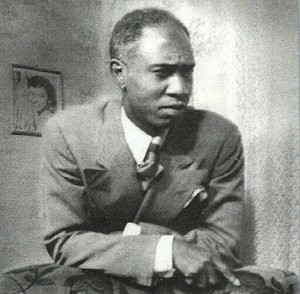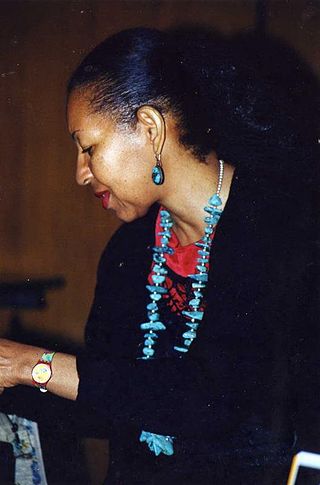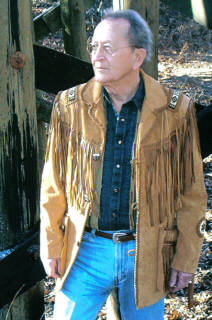Related Research Articles

Melvin Beaunorus Tolson was an American poet, educator, columnist, and politician. As a poet, he was influenced both by Modernism and the language and experiences of African Americans, and he was deeply influenced by his study of the Harlem Renaissance.

Ai Ogawa was an American poet and educator who won the 1999 National Book Award for Poetry for Vice: New and Selected Poems. Ai is known for her mastery of the dramatic monologue as a poetic form, as well as for taking on dark, controversial topics in her work. About writing in the dramatic monologue form, she's said: "I want to take the narrative 'persona' poem as far as I can, and I've never been one to do things in halves. All the way or nothing. I won't abandon that desire."

Ron Padgett is an American poet, essayist, fiction writer, translator, and a member of the New York School. Great Balls of Fire, Padgett's first full-length collection of poems, was published in 1969. He won a 2009 Shelley Memorial Award. In 2018, he won the Frost Medal from the Poetry Society of America.
Maurice Frank Kenny was an American poet who identified as Mohawk descent.

Joy Harjo is an American poet, musician, playwright, and author. She served as the 23rd United States Poet Laureate, the first Native American to hold that honor. She was also only the second Poet Laureate Consultant in Poetry to have served three terms. Harjo is a member of the Muscogee Nation and belongs to Oce Vpofv. She is an important figure in the second wave of the literary Native American Renaissance of the late 20th century. She studied at the Institute of American Indian Arts, completed her undergraduate degree at University of New Mexico in 1976, and earned an MFA degree at the University of Iowa in its creative writing program.
Inoyat Hojieva, mostly known as Farzona is a Tajik poet and writer. She won a lifetime achievement award.
Xayacamach of Tizatlan was an Aztec poet from the Pre-Columbian state of Tlaxcallan, born between 1450 and 1455.

Jim Weaver McKown Barnes is an American writer who was born near Summerfield, Oklahoma. He received his BA from Southeastern State University and his MA and Ph.D. from the University of Arkansas. He taught at Truman State University from 1970 to 2003, where he was Professor of Comparative Literature and Writer-in-Residence. After retiring from Truman State, he was Distinguished Professor of English and Creative Writing at Brigham Young University until 2006. On January 15, 2009, Barnes was named Oklahoma Poet Laureate for 2009–2010. He describes his ancestry as "an eighth Choctaw" and "a quarter Welsh".
"Life is Motion" is a poem from Wallace Stevens's first book of poetry, Harmonium. It was first published in 1919, so it is in the public domain.
Leroy V. Quintana is an American poet, and Vietnam Veteran.

Nathan Brown is an author, singer-songwriter, and award-winning poet who served as the Oklahoma Poet Laureate from 2013 to 2014.
"Earthy Anecdote" is the first poem in Wallace Stevens' first book of poetry Harmonium (1923). The passage of a group of "bucks" is impeded by a "firecat". There is little consensus about its meaning, even after 100 years of critical attention, and Stevens himself refused to provide one. On the surface, his poem describes a herd of deer that stampede ("clatter") left and right in order to avoid a lurking wildcat, who pounces back and forth in front of them, and afterwards closes its eyes and sleeps.

Carol Hamilton was the Oklahoma Poet Laureate from 1995 to 1997.
Violet McDougal (1893–1989) was an American poet. She was the first poet laureate of the state of Oklahoma, serving from 1923 to 1931.
Betty Lou Shipley was the twelfth poet laureate of the state of Oklahoma. Shipley's term as laureate was cut short by her death. Along with authoring three books of poetry, Shipley was the poetry editor for Byline Magazine and operator of Full Count Press and, later, Broncho Press.
Rudolph Nelson Hill (1903-1980) was the eighth poet laureate of Oklahoma, appointed by Governor Henry Bellmon, in 1966. Born in Missouri, Hill was raised in central Oklahoma and lived most of his life in Wewoka. Hill was educated at The University of Oklahoma and worked as a lawyer. In 1970, Hill was a named a Poet Laureate Emeritus by Governor Dewey Bartlett.
Leslie A. McRill (1886-1982) was the ninth poet laureate of Oklahoma, appointed by Governor Dewey F. Bartlett in 1970. McRill was born in Kansas but lived much of his life in Oklahoma and graduated from the college which is now Oklahoma City University. He also earned a master's degree in French from the University of Southern California.

Maggie Culver Fry (1900-1998) was the tenth poet laureate of Oklahoma, appointed in 1977 by Governor David L. Boren. Fry wrote her first poem at the age of 10 and now has more than 800 stories, poems, and articles published.
Eddie D. Wilcoxen served as the eighteenth poet laureate of the state of Oklahoma, appointed by Governor Brad Henry. Previous to his appointment, Wilcoxen was well known as a broadcaster with KWHW (AM) in Altus, Oklahoma. Wilcoxen's poetry is best classified as "folk" poetry, with an emphasis on rural life and traditions. Wilcoxen was also an accomplished karateka, training under the accomplished karateka and kickboxer, Joe Lewis. Wilcoxen then went on to create his own form of karate that he named Kihido Karate, kihido meaning "The Shining Spirit Way".
References
- ↑ Leon-Portilla, Miguel (2000). Fifteen Poets of the Aztec World. Oklahoma: University of Oklahoma Press.